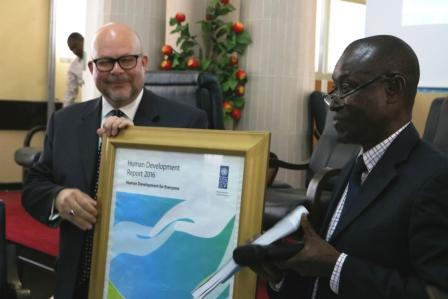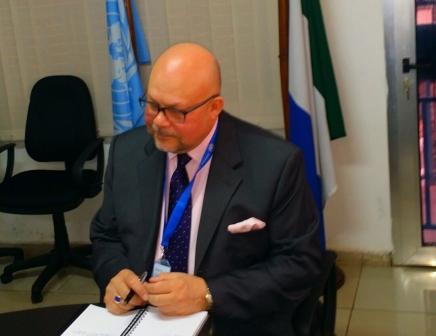Sierra Leone makes steady progress in human development despite Ebola but deep poverty and inequality persist
Freetown, 10 March 2016 – Minister of State for Finance and Economic Development, Alhaji F.B.L Mansaray has launched the 2015 Global Human Development Report (HDR) titled Work for Human Development in Freetown, Thursday March 10. The report shows that Sierra Leone continues to make steady progress in human development despite the recent devastating Ebola epidemic in 2014-2015, but that deep poverty and various forms of inequality in Sierra Leone are among the highest in Africa.
The country moved one position up the Human Development Index (HDI) placing the country in 181 out of 188 countries with an HDI value of 0.413, but still below the 0.518 average for Sub Saharan Africa. Liberia is positioned at 177, Guinea at 182 and Ghana at 140 out of 188 countries. This means that Sierra Leone has overtaken its bigger neighbour Guinea for the first time while Liberia continues to lead its two bigger Mano River neighbours on the Human Development Index.
The report further shows that 77.5% of the population of Sierra Leone (about 4, 724,000 people) are multi-dimensionally poor even though income poverty (i.e. $1.2 per day) is 56.6%. Liberia’s multidimensional poverty is 70.1%, Guinea is 73.8% and Ghana 30.5%. The concept of multi-dimensional poverty, which was introduced in 2010 in the HDR and which identifies multiple deprivations in the poverty and not just income at house hold levels
According to the report, summarized and presented by the UNDP Economic Advisor Dr. Moses Sichei, said that even though Sierra Leone’s HDI for 2014 is 0.413, when the value is discounted for inequality, the HDI falls to 0.241, a loss of 41.7% in human development due to inequality in health, education and income dimensions. Percentage losses in human development due to inequality for peers are- Guinea (36.5%), Liberia (34.8%), Cote d’Ivoire (38%), Ghana (33.1%), while the average for Sub Saharan Africa is 33.3%.
Sierra Leone’s gender inequality remains very high with only 12.4 percent of parliamentary seats held by women and only 10% of adult women have reached at least secondary level of education compared to 21.7% for their male counterparts. Gender Inequality Index (GII) reflects gender based inequalities in the areas of reproductive health, empowerment and economic activity. Sierra Leone’s GII value in 2014 is 0.650 (rank 145 out of 155 countries). This implies that there is 65.0% loss in human development as a result of gender inequalities in reproductive health, empowerment and economic activity.
UNDP Country Director Sudipto Mukerjee noted the lack of progress in gender equality and empowerment and called for the opportunity in the current constitutional review process “To make truly transformational and lasting changes on gender for more just, inclusive, prosperous and sustainable future,”
Minister Alhaji Mansaray expressed the Government’s commitment to “accelerate human development as part of the Agenda for Prosperity and implementation of the new global goals – the Sustainable Development Goals.”
The Report itself focuses on work and human development and seeks to ask a fundamental question – how can work enhance human development? It applies a broad definition of work which includes unpaid and paid, voluntary work and creative work.
Mr. Mukerjee noted on the content of the report “The 2015 Human Development Report examines the key relationship between work and human development. It envisions work as the means for unleashing human potential, creativity, innovation and spirits. Work empowers people to earn a living, gives them a means to contribute in society, provides them with security and gives them a sense of dignity. These are all essential aspects of human development.”
Stay with Sierra Express Media, for your trusted place in news!
© 2016, https:. All rights reserved.





